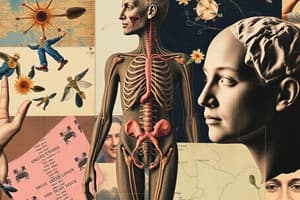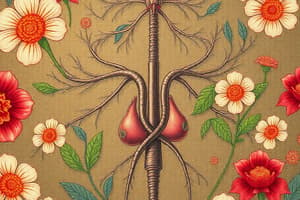Podcast
Questions and Answers
What is the primary function of growth hormone (GH)?
What is the primary function of growth hormone (GH)?
- Promotes growth and development of the body (correct)
- Regulates metabolic reactions
- Stimulates thyroid hormone production
- Regulates water and electrolyte balance
Which hormone is primarily responsible for the reabsorption of water and electrolytes?
Which hormone is primarily responsible for the reabsorption of water and electrolytes?
- Adrenocorticotropic hormone (ACTH)
- Antidiuretic hormone (ADH) (correct)
- Thyroid stimulating hormone (TSH)
- Follicle stimulating hormone (FSH)
Which hormones are secreted by the pars distalis of the pituitary gland?
Which hormones are secreted by the pars distalis of the pituitary gland?
- Growth hormone (GH) and Thyroid stimulating hormone (TSH) (correct)
- Melanocyte stimulating hormone (MSH) and Oxytocin
- Insulin and Glucagon
- Melatonin and Aldosterone
What role does T3 and T4 produced by the thyroid gland play?
What role does T3 and T4 produced by the thyroid gland play?
Which gland secretes melatonin, and what is its primary function?
Which gland secretes melatonin, and what is its primary function?
What is the primary function of the thymus gland?
What is the primary function of the thymus gland?
Which hormone is secreted by the adrenal cortex to support gluconeogenesis?
Which hormone is secreted by the adrenal cortex to support gluconeogenesis?
What is the function of glucagon produced by alpha cells in the pancreas?
What is the function of glucagon produced by alpha cells in the pancreas?
What is the role of adrenaline secreted by the adrenal medulla?
What is the role of adrenaline secreted by the adrenal medulla?
Which glands secrete parathyroid hormone (PTH)?
Which glands secrete parathyroid hormone (PTH)?
Flashcards are hidden until you start studying
Study Notes
Hormones and Their Functions
- Hormones function as intercellular messengers, regulating development, metabolism, and growth.
- Growth hormone specifically promotes overall body growth and development.
- Secreted in trace amounts, hormones play critical roles in various metabolic processes.
Pituitary Gland
- Pars distalis produces six key trophic hormones:
- Growth Hormone (GH): Stimulates growth.
- Thyroid Stimulating Hormone (TSH): Regulates thyroid gland activity.
- Adrenocorticotropic Hormone (ACTH): Stimulates adrenal cortex production.
- Follicle Stimulating Hormone (FSH): Involved in reproductive processes.
- Luteinizing Hormone (LH): Regulates ovulation and testosterone production.
- Prolactin (PRL): Stimulates milk production.
- Pars intermedia secretes:
- Melanocyte Stimulating Hormone (MSH): Influences pigmentation.
- Pars nervosa secretes:
- Antidiuretic Hormone (ADH): Promotes water reabsorption and electrolyte balance.
- Oxytocin: Facilitates childbirth and maternal bonding.
Hypothalamus Hormones
- ADH: Essential for water retention in the kidneys.
- Oxytocin: Key role in childbirth and lactation.
Thyroid Gland
- Follicles secrete T3 and T4 (Thyroxin), crucial for regulating basal metabolic rate (BMR).
- Parafollicular cells secrete Calcitonin (TCT), involved in calcium metabolism.
- Plays essential roles in growth, metabolism, and menstrual cycle regulation.
Other Endocrine Glands
- Pineal Gland: Produces melatonin, regulating sleep-wake cycles and body temperature.
- Adrenal Cortex:
- Produces Aldosterone: Regulates sodium and potassium balance.
- Produces Cortisol: Involved in stress response and metabolism.
- Pancreas:
- Exocrine Function: Produces pancreatic juices containing lipases.
- Endocrine Function:
- B-cells: Secrete insulin, promoting glucose utilization and storage (glycogenesis).
- A-cells: Secrete glucagon, stimulating energy release and raising blood glucose levels (glycogenolysis and gluconeogenesis).
Additional Glands and Their Functions
- Parathyroid Glands: Secrete Parathyroid Hormone (PTH), which increases blood calcium levels.
- Thymus Gland: Secretes thymosins, enhancing T-cell production and immune response.
Adrenal Gland
- Adrenal Cortex:
- Mineralocorticoids: Manage water and electrolyte balance.
- Glucocorticoids (Cortisol): Affect metabolism, blood pressure, and inflammation.
- Gonadocorticoids: Involved in the production of sex hormones.
- Adrenal Medulla:
- Secretes Adrenaline: Increases heart rate and alertness during stress.
- Secretes Noradrenaline: Works alongside adrenaline, affecting similar physiological responses.
Summary of Pancreatic Functions
- Exocrine Part: Produces digestive enzymes.
- Endocrine Part (Islets of Langerhans):
- B-cells: Insulin release lowers blood sugar levels.
- A-cells: Glucagon release raises blood sugar in response to low levels.
Studying That Suits You
Use AI to generate personalized quizzes and flashcards to suit your learning preferences.




